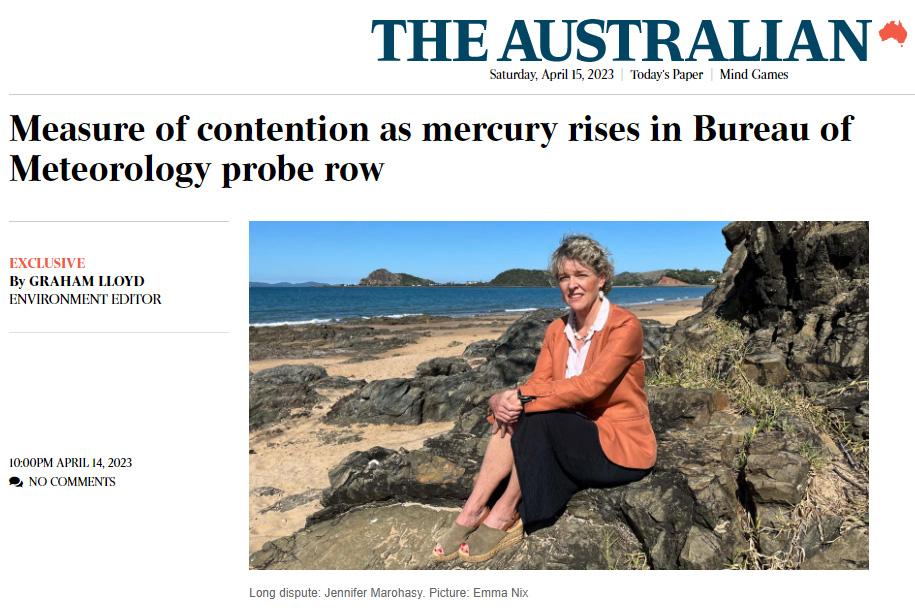The BOM don’t want Australians to see the raw data
Electronic thermometers may read up to 0.7 degrees higher than glass ones.
Sometime in the mid-1990s the Australian Bureau of Meteorology replaced many of their glass thermometers with electronic sensors. They claimed they were carefully verified to match the slow way the old glass thermometers worked — after all, we wouldn’t want to use gizmos that recorded new all-time *Hottest Ever Records* that were actually just one-second gusts of hot air, would we? Our newspapers would be full of meaningless headlines about how Climate Change made us hotter than ever in history, when really it was just a mistaken effect of a new type of thermometer. Imagine that disaster of public policy…
Of course this question is so easily solved. The BoM just needed to keep the two thermometers side by side in the same boxes and record all that data. Then they could release it, showing how well the electronic gadgets mimicked the glass thermometers, and Australians everywhere would feel confident that BoM was the sterling agency they thought it was. Instead Skeptics have been asking for comparison data for nine years and the BoM has refused, hedged, asked exorbitant fees, destroyed data and when the FOI requests came — fought them tooth and nail to stop Australians from seeing what their thermometers recorded.
Climate change threatens life on Earth, but the BoM isn’t that interested in accurate data, doesn’t want to convince the skeptics, doesn’t care if the trends are affected by equipment changes and can’t afford some extra flash drives, even though it gets nearly a million-dollars-a-day. Sure.
Jennifer Marohasy and John Abbott have doggedly pursued the BoM for three years with FOI requests. Finally the BoM have released a tiny fraction of the total, and it is as we suspected — electronic sensors can measure flickering changes in temperature that glass thermometers don’t pick up. Other agencies around the world average out the data from electronic gizmos but the Australian BOM says they have special thermometers which are designed to mimic the old thermometers, and they work so well the BOM can’t let you see any of that data….
Mercury rises in Bureau of Meteorology probe row
Graham Lloyd, The Australian
The documents, released after a years-long Freedom of Information campaign, show temperature measurements taken using updated BOM probes in automatic weather stations at the Brisbane Airport site could be up to 0.7C warmer than the temperature taken using a traditional thermometer at the same time at the same site.
More than three years after a FOI request for parallel data was lodged by scientist John Abbot, the BOM released three years of data on Easter eve after the matter was taken to the Administrative Appeals Tribunal.
The BoM says there’s no significant difference:
Yet analysis of the data by scientist Jennifer Marohasy has found a statistically significant difference exists. Over the three-year period for which records have been made available, probes returned temperatures higher than the mercury thermometers placed alongside them 41 per cent of the time… and lower 25.9 per cent of the time.
Dr Marohasy said the BOM had not disputed that the probe at Brisbane Airport had recorded up to 0.7C warmer than the mercury at the same site at the same time.
Once again, the BoM releases it in the most inconvenient way possible — 1,000 sheets of paper?
The documents released by the BOM under the FOI request included 1094 A8 reports with the handwritten daily maximum and minimum temperatures from both probes and traditional liquid-in-glass thermometers recorded from instruments in the same shelter/Stevenson screen.
They represent about 20 per cent of the parallel records held for the Brisbane airport site, one of 38 sites originally requested under FOI.
So does the BoM collect electronic data, and write it by hand on paper? They don’t digitize it and run it through the supercomputer — they analyze it with pen, paper and slide rule?
Or perhaps they have all the handy digital files, but they don’t want to hand over all the nuclear launch codes, I mean “top secret” thermometer readings…
Dr Marohasy said the data represented just three of the 14.5 years (January 2008 to July 2022) of parallel data that the bureau held for Brisbane Airport.
“It is also just a fraction of the 760 years of parallel data the bureau holds for 38 different locations spread across the landmass of Australia,” she said.
Trust us, our thermometers are so good we can’t tell you:
The rest of the world averages electronic temperatures over longer periods, but the Australian BOM has better thermometers:
Bureau chief executive Andrew Johnson has told her the probes were specifically designed to have a long response time to mirror the behaviour of mercury in glass, making numerical averaging unnecessary.
Dr Marohasy said the lack of numerical averaging despite the use of probes made the BOM measurements unique in the world.
If Climate Change is caused by electronic “thermometers” it’ll be cheaper to solve…
UPDATE: The effect the electronic sensors can have is so much more complicated than “mean temperature” deviations. Even if the average temperature recorded by an electronic sensor was the same as as a glass one, the extremes could be quite different. And the behaviour of air, turbulence and variability at 3pm when maximum temperatures are recorded is different to the pre-dawn minimum hour of day. At the very least, electronic sensors could be offering up many more “Headline” records for heat, and increasing three day, five day, week long heatwaves, plus hottest nights, more days over 35C — there are many cherries to be picked here. Potentially, the electronic sensors offer a bonanza of propaganda headlines for the Green Blob to pick from, especially when “coldest ever days” get ignored by the media.
Read it all in The Australian.


